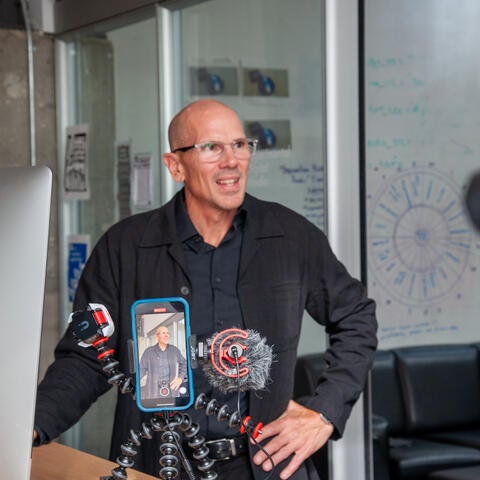
Courageous innovators must become champions of tech for good
An ethical approach to technological change is growing in Waterloo’s innovation ecosystem

An ethical approach to technological change is growing in Waterloo’s innovation ecosystem
By Faculty of ArtsDr. Marcel O’Gorman is a University of Waterloo Research Chair and founder of the Critical Media Lab. Strategically located in the heart of Waterloo Region’s tech hub, the lab is an interdisciplinary research initiative that explores the ethics and impact of technology on society and the human condition.
With innovations happening at a rapid pace, technologies are often adopted before the full impact on culture and human behaviours is understood. We asked O’Gorman how we should lead technological transformation to ensure a safe and human-centred digital future.

Dr. Marcel O’Gorman
Professor, Faculty of Arts
> University Research Chair
> Founding director, Critical Media Lab
Opinion by Dr. O'Gorman
The promise of tomorrow’s tech has inspired the imagination of every generation. It is said that we shape technology, and thereafter it shapes us. It is an understatement then to say that the stakes of future tech innovation are very high. Now and in our future, we can’t imagine our technological future without considering the broader social and environmental contexts of that future.
Waterloo has been a champion of innovation for years, and we continue to lead the way in Canada and beyond. Now we have a unique opportunity to be a champion — an exemplar, even — of responsible innovation.
A culture of responsible innovation needs to be rooted in sensitivity to human values, non-human stakeholders and a committed sense of care for the future. This is not just a technological challenge or a problem to solve. It’s about persistently asking the right questions: What kind of world do we want to live in? And who is “we” in the first place? Can our future technologies avoid replicating the social and environmental problems that are embedded in our current tech ecosystem?
There are many reasons to be concerned about our technological present: facial recognition interfaces that misrecognize black women; conflict minerals mined for circuit board components; the cloud’s obscene energy consumption; predatory data-gathering; and targeted “fake news” that fuels the fire of political polarity.

The tech community can do better, but only if it resists a profit-at-all-costs value system. This sort of retooling is a lot to ask, but our community is up to the challenge.
The phrase “tech for good” might bring to mind humanitarian technologies such as tech that supports a specific cause. But a commitment to “tech for good” means that all technology should improve life on earth, keeping in mind that “good” is a relative term that changes according to context.
Embedding a respect for variable contexts into the tech design process is the first step toward establishing a culture of “tech for good,” a culture that takes responsibility for the world it is building and carefully considers potential consequences of innovation — even if that might slow down the process. There is no room in responsible innovation for a “move fast and break things” mentality.
The technological change incubated in Waterloo region is enormous. Taking responsibility for the social and environmental outcomes of that change requires purposeful interventions. The Tech for Good Declaration, which I helped develop with Communitech and other partners, is a good first step. It’s time to put these words into action.
This is precisely why I founded the Critical Media Lab more than a decade ago. It provides a safe space to slow down and reflect on the impacts of technology. These projects range from the design of artistic “objects-to-think-with” that facilitate critical discussions, new policy formation and practical workshops in responsible innovation for startups, tech professionals and students.
We want to create a context for critical engagement, making room in the tech ecology for courageous innovators who will go beyond the design of good tech and strive to become champions of tech for good.

Read more
Talking about complex societal issues requires trusted experts to combat disinformation

Read more
Ribbit’s pilotless planes are set to make the future of air more inclusive and sustainable

Read more
Technology can help solve the challenges of our health-care crisis and transform the future of care
The University of Waterloo acknowledges that much of our work takes place on the traditional territory of the Neutral, Anishinaabeg, and Haudenosaunee peoples. Our main campus is situated on the Haldimand Tract, the land granted to the Six Nations that includes six miles on each side of the Grand River. Our active work toward reconciliation takes place across our campuses through research, learning, teaching, and community building, and is co-ordinated within the Office of Indigenous Relations.